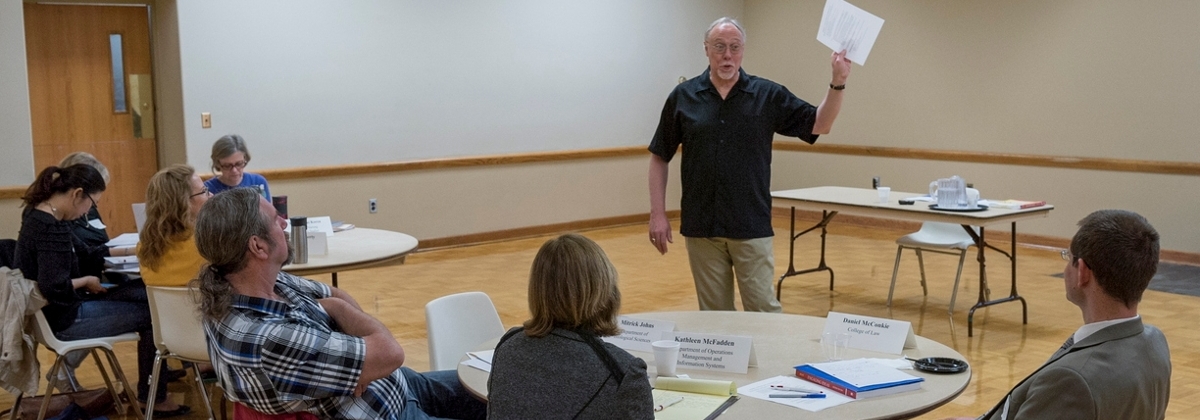- Writing Across the Curriculum
- Workshops
Workshops

NIU's faculty know that students must learn to write well. Employers who want to hire NIU graduates feel the same. Even students agree. The question is how to teach it.
You can learn more about effective writing instruction methods in our workshops. You’ll have the opportunity to meet colleagues who share the same interests and concerns about teaching writing well. Find out how to incorporate writing that truly engages your students in your courses.
You can also request faculty coffee-hour workshops tailored to specific department and programmatic needs. Or sign up for one or more of our workshop series, offered throughout the fall and spring semesters.
May Workshops
Each May, we partner with the Faculty Development and Instructional Design Center to offer two daylong writing workshops. Please watch your email for invitations to register from the Faculty Development and Instructional Design Center or check the update on their website.
Design a Writing-Enhanced Course
In this interactive workshop offered in May, you will focus on a course that you currently teach. You will engage in activities that help you decide what kinds of writing activities best enhance the critical thinking you want your students to do. Receive your copy of John Bean's Engaging Ideas, which will guide you through a day of fun and useful hands-on activities.
Please prepare briefly written answers to these questions and bring three copies to the workshop:
- What is the course you want to transform into a writing-infused course?
- What kinds of writing do you currently include in the course?
- What are the main units or modules in your course?
- What are your main learning objectives (or chief concepts and principles) for the course?
- What thinking skills are important in your course—and crucial to your academic discipline?
- What are the most difficult aspects of the course, based on previous students' experience?
- What problems do students typically have with the writing tasks you set?
- What difference do you want your course to make in your students' lives?
Topics for the workshop include:
- Linking writing to critical thinking.
- Preventing "data-dump" papers.
- Writing to learn.
- Designing assignments.
- Creating rubrics.
- Responding before grading.
Write Well, Publish More
This daylong, interactive workshop focuses on how you can continue your program of scholarly publishing and other projects. You will learn about techniques that can help you make the most of your time to research and write.
The workshop centers on four research-based premises:
- Each writer has an individually unique process.
- A writer can improve their process by becoming more aware of it.
- A writer can become more prolific by setting a daily schedule.
- A writer can benefit significantly from interaction with other writers.
You'll receive a copy of Elizabeth Rankin's Work of Writing. You'll have the opportunity to participate
in activities that will help you:
- Improve your writing habits.
- Consider an array of publishing opportunities.
- Determine where to publish and how to get funding.
- Prioritize on the kinds of publishing your discipline values most.
- Become a better self-editor.
- Form faculty "writing circles."
- Make the best use of feedback from colleagues and editors.
Workshop Series
The workshops described below are designed for you to fit into your busy schedule. Each one lasts for a 75-minute class period or less and can be adapted for departments and programs. Focus is on developing materials you can put immediately to use in your classes. Note: workshop topics may not be scheduled in the order listed below. Watch for email messages from the Faculty Development and Instructional Design Center.
Teach Writing as a Process
What does "scaffolding" mean? Guide students through a series of short activities that add up to better written work and easier grading.
Improve Students' Reading Skills through Writing
How do we help students grapple with complex texts? Discover techniques that make students better readers—and writers.
Help Students Avoid Plagiarism
How can we guide students away from academic misconduct? Advice from the National Council of Writing Program Administrators shows you.
Lighten Your Paper Load
What are smart ways to assign, manage, and grade papers? Make your life easier while motivating students through rubrics and "minimal marking."
Respond Effectively to Student Writing
Why do students need revision-oriented feedback? See how effective, time-saving response encourages students to do their best work and learn more.
Design Effective Collaborative Assignments
How can students benefit from multiple authorship? Structure writing tasks that motivate students to learn from each other.
Design Short Writing Assignments that Work
What are alternatives to the dreaded term paper? Improve students' written skills and mastery of course content with short assignments you'll enjoy grading.
Help Students Develop Visual Literacy
What are the connections between perception and thought in your discipline? Improve students' writing with techniques that combine critical analysis, interpretation, and seeing.
Create Digital Writing Activities
How do electronic environments affect writers and writing? Spark students' 21st-century communications skills using technology.
Facilitate "E-Portfolio Learning"
Why are e-portfolios effective as course projects? Discover ways that these digital tools prompt students to reflect on how they engage with course content.